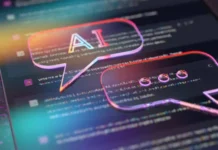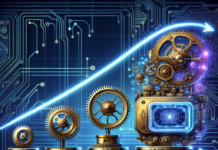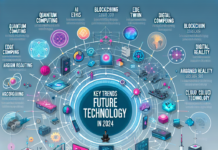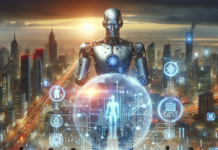In today’s fast world, Artificial Intelligence (AI) is making a big impact. It’s changing how we live and work. From new healthcare ideas to easier banking, AI is amazing.
Let’s look at how AI is changing our lives. It’s making our interactions, decisions, and work better in many areas.
Key Takeaways
- Artificial Intelligence is a growing force across multiple industries.
- AI technology enhances human capabilities and drives efficiencies.
- The AI revolution is impacting sectors like healthcare, finance, and education.
- Understanding AI capabilities can help in leveraging its benefits.
- Artificial Intelligence is reshaping our everyday experiences.
The Basics of Artificial Intelligence
Understanding the AI fundamentals is key for anyone wanting to see how tech changes our world. What is Artificial Intelligence? Simply, it’s computer systems that act like humans. They can do tasks that need thinking, like understanding language and solving problems. Knowing the different types of AI is important as the field grows.
What is Artificial Intelligence?
AI includes many technologies that try to think like humans. Machine learning is a part of AI that lets systems get better with data. Knowing AI terminology helps us dive deeper into this exciting field.
Types of Artificial Intelligence
There are mainly three kinds of types of AI:
- Narrow AI: This type is made for specific tasks, like Siri and Alexa.
- General AI: This is the dream AI that can understand and do many things like humans.
- Superintelligent AI: This is still just an idea, but it would be smarter than humans in almost everything.
Key Terms and Concepts
Learning the main terms of AI fundamentals helps us understand AI better. Ideas like neural networks and deep learning are key to how AI works. Getting to know these terms helps us see the power of what is Artificial Intelligence.
Applications of Artificial Intelligence in Everyday Life
AI is changing many areas, making things more efficient and enjoyable. It’s now a big part of our daily lives, especially in healthcare, finance, education, and transportation.
AI in Healthcare
AI is changing healthcare in big ways. It helps doctors diagnose and predict patient outcomes. It also helps manage resources better.
AI in Finance and Banking
Banks use AI for many things. It helps spot fraud and makes transactions safer. It also makes banking more personal with chatbots and automated services.
AI in Education
AI is making learning better. It tailors lessons to fit each student’s needs. This makes learning more fun and effective.
AI in Transportation
AI is changing how we get around. Companies like Tesla and Waymo are leading the way. Their self-driving cars improve safety and efficiency on the road.
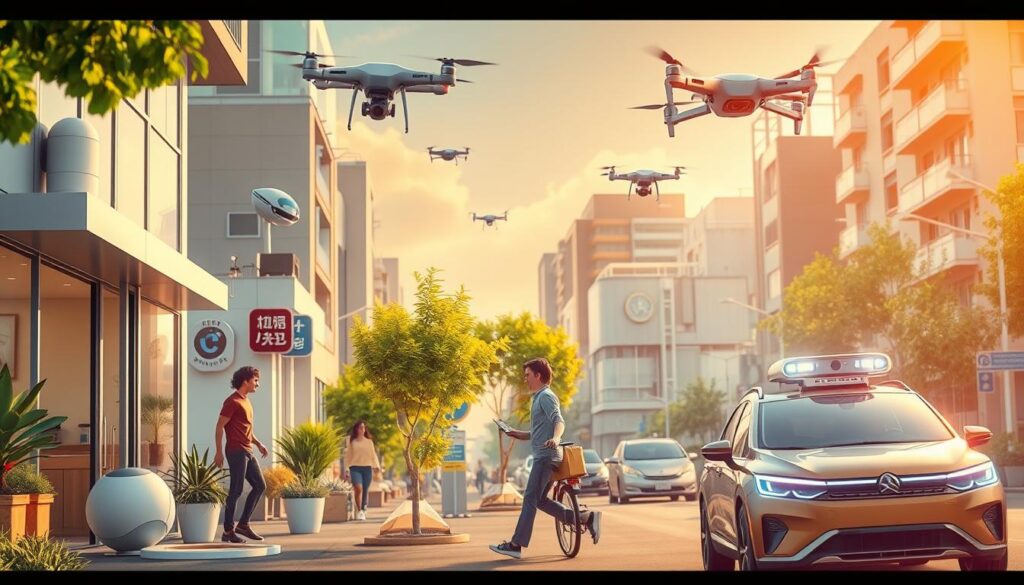
How Artificial Intelligence is Transforming Industries
Artificial Intelligence is changing many sectors, making things more efficient and engaging. It’s making a big difference in manufacturing, retail, and entertainment. By understanding how AI is changing these areas, we see its wide range of uses and benefits.
Manufacturing and Automation
AI is leading the way in manufacturing innovation. It makes operations smoother and cuts down on mistakes. Companies like Siemens and General Electric use AI for predictive maintenance, fixing problems before they start.
This not only boosts efficiency but also makes workplaces safer.
Retail and Customer Service
AI is changing how we shop. It helps businesses offer what customers really want, making them happier. Amazon shows how AI can manage inventory and understand shoppers better.
Retailers can now guess what customers need and keep the right stock. This makes shopping easier and more enjoyable.
Entertainment and Media
The entertainment world is also feeling AI’s impact. Streaming services use AI to suggest shows based on what you like. Netflix’s system is a great example of how AI can make watching shows better.
This personal touch not only keeps viewers interested but also changes how we enjoy media.
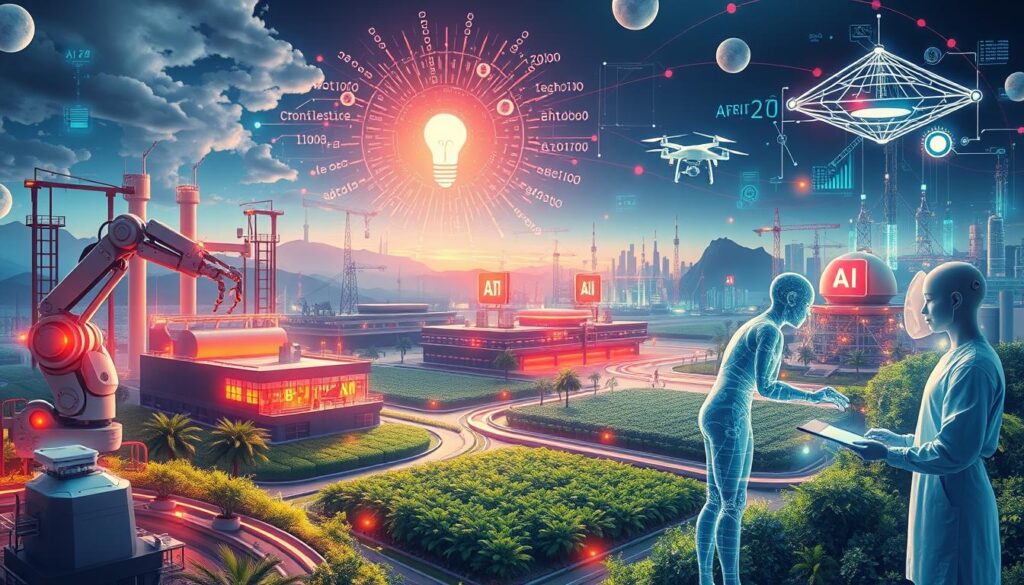
| Industry | Applications of AI | Benefits |
|---|---|---|
| Manufacturing | Predictive maintenance, automation | Increased efficiency, reduced downtime |
| Retail | Personalized recommendations, inventory management | Higher customer satisfaction, optimized stock levels |
| Entertainment | Viewer analytics, content personalization | Enhanced user engagement, tailored experiences |
The Impact of Artificial Intelligence on Society
Artificial intelligence is changing many areas of life. It’s making big changes in jobs and how we think about right and wrong.
Job Displacement and Creation
AI is changing jobs, both good and bad. Some jobs might disappear as machines take over. But, AI is also creating new jobs, especially in tech and data.
People who lose their jobs can learn new skills. This helps them find work in the new AI world.
Ethical Considerations in AI
AI’s growth also raises big questions. We need to talk about fairness, privacy, and who’s responsible for AI choices. Companies must use AI in a way that helps everyone, not just a few.
| Aspect | Job Displacement | Job Creation | Ethical Concerns |
|---|---|---|---|
| Automation in Manufacturing | High risk of job loss | New tech-related positions | Bias in operational systems |
| Healthcare Innovations | Reduced administrative roles | Roles in AI development | Patient data privacy |
| Financial Services | Displacement in traditional roles | AI oversight positions | Accountability for AI decisions |
AI is bringing both good and bad changes. We must focus on jobs and ethics as AI grows. This will help us navigate these changes wisely.
Artificial Intelligence and the Future of Work
AI is changing the job landscape in big ways. As tech advances, workers need new skills to stay ahead. Knowing what skills are needed for AI is key to staying competitive.
Skills Needed for an AI-Driven Workforce
In a world where AI is everywhere, professionals need diverse skills. Important skills include:
- Data analysis: Being able to understand and use data well is crucial.
- AI programming: Knowing how to code and work with AI frameworks is important.
- Critical thinking: Analytical skills help solve problems that AI can’t.
- Adaptability: Being open to new tech and methods is essential for learning.
Collaborating with AI: A New Paradigm
AI is changing how we work together. Working with AI can make us more productive and creative. It’s important to learn how to use AI tools well.
This teamwork between humans and AI is changing jobs. It lets us focus on creative tasks while AI handles routine ones.
Remote Work and AI Technologies
AI is key to remote work. It helps automate tasks, improve communication, and track performance. This makes work more flexible and dynamic.
Getting Started with Artificial Intelligence
If you’re excited to explore artificial intelligence, start by learning the basics. Online resources like Coursera and edX have many courses for beginners. These courses make AI easy to understand, even for those new to it.
After you learn the basics, try out beginner-friendly AI tools. Google’s Teachable Machine is a great tool for beginners. It lets you create simple AI models without needing to be a tech expert. This hands-on approach makes learning fun and helps you see AI in action.
Joining online forums is also a good idea. Talking with others who are also learning AI can be very helpful. It lets you share knowledge and learn from different viewpoints. Keeping up with the latest AI news helps you use AI in your life and work.



